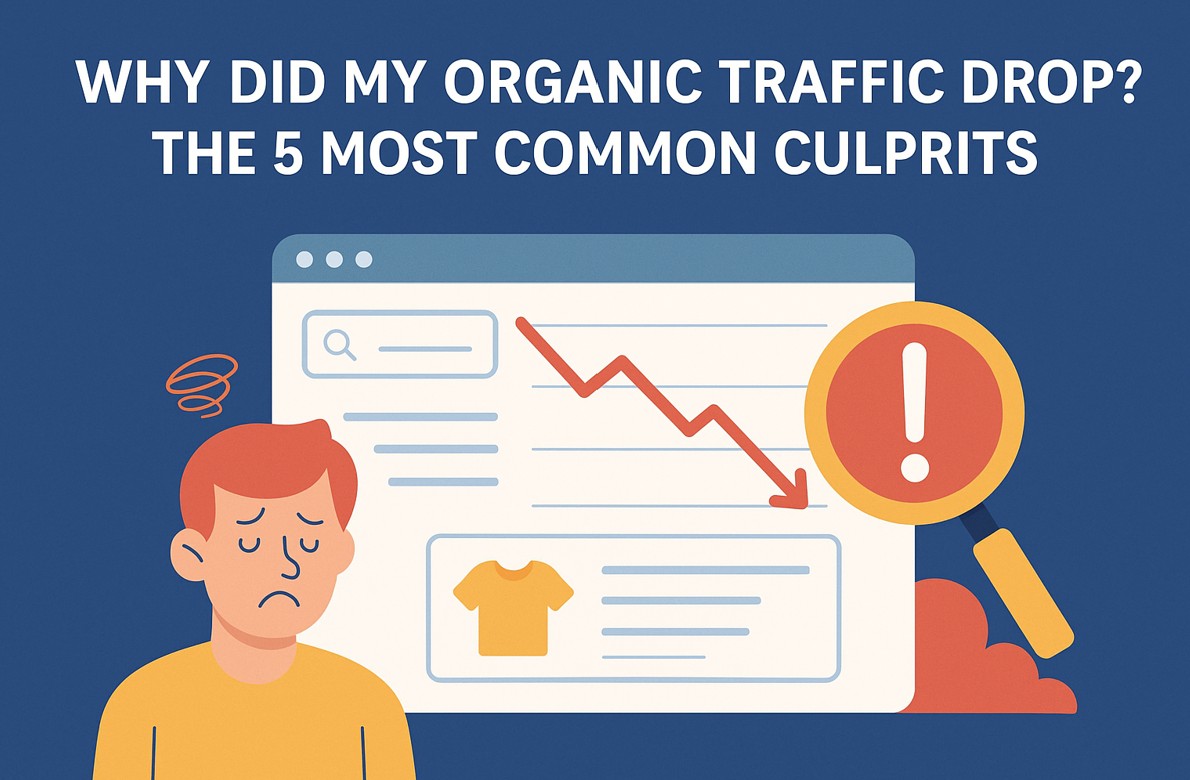If you’ve been monitoring your website’s performance, you’ve probably noticed a drop in organic traffic at some point. One day you’re riding high with traffic flowing in, and the next day—nothing. It’s frustrating, but don’t panic. Understanding the reasons behind a drop in organic traffic is the first step toward recovering and getting back on track.
In this article, we’ll cover the five most common causes of a drop in organic traffic and what you can do to fix it. Let’s dive in!
1. Google Algorithm Updates: Is Your Website in the Crosshairs?
One of the most common reasons for a sudden drop in organic traffic is a Google algorithm update. Google rolls out algorithm updates regularly to improve the quality of search results. While these updates can be beneficial, they sometimes negatively impact websites that don’t comply with the updated guidelines.
Google’s algorithm changes are designed to reward high-quality, authoritative websites that provide a positive user experience. If your website is not up to par, these updates could affect your rankings and, as a result, your organic traffic.
How to Fix It:
To recover from a Google algorithm update penalty, you first need to identify which update affected your website. Use Google Analytics and Google Search Console to check when your traffic started to drop. Look for patterns related to specific updates.
Once you’ve identified the cause, you can:
- Review and improve your content quality.
- Focus on increasing the site’s authority through high-quality backlinks.
- Fix technical issues that may hinder crawlability or user experience.
If you think your website has been negatively impacted by an update, consider reaching out to an SEO consultant or agency to help you with the recovery process.
2. Technical SEO Issues That Are Hindering Crawlers
Technical SEO problems are another significant culprit behind a sudden drop in organic traffic. Your website may have technical issues that prevent search engines from properly crawling and indexing your pages.
Some common technical issues include:
- Broken links
- Slow page load speed
- Mobile usability issues
- Missing or incorrect robots.txt files
- Duplicate content
- 404 errors
If Googlebot cannot crawl and index your pages efficiently, your pages won’t rank well, leading to a decline in organic traffic.
How to Fix It:
Conduct a thorough technical SEO audit to identify any issues that may be affecting your site’s performance. Some tools, like Screaming Frog, Sitebulb, or Google Search Console, can help you find and fix technical problems.
Once you’ve identified the issues, prioritize fixing them:
- Ensure that all important pages are accessible to Googlebot.
- Speed up your website by optimizing images and utilizing browser caching.
- Fix broken links and redirects to ensure that users and search engines can navigate your site smoothly.
Fixing technical SEO issues might take some time, but it’s worth it to get your website back on track.
3. Loss of Backlinks: Your Website’s Authority Is Taking a Hit
Backlinks (links from other websites to your own) are a key factor in Google’s ranking algorithm. If you lose a significant number of backlinks, especially from high-authority domains, your website’s authority could drop, and so will your organic traffic.
There are many reasons why you might lose backlinks:
- Websites you’re linked to may have gone offline.
- The content you were linked from may have been removed.
- Competitors may have created better content and attracted backlinks away from your pages.
How to Fix It:
Use a backlink analysis tool (such as Ahrefs, SEMrush, or Moz) to check for lost backlinks. Once you know which links are missing, you can:
- Reach out to the websites that removed your links and ask them to restore the backlink.
- Try to acquire new backlinks from high-authority sites.
- Create better, more valuable content to attract fresh links.
Backlinks are vital to your website’s authority and ranking, so it’s important to keep an eye on them regularly and work to maintain or increase your backlink profile.
4. Poor Content Quality or Outdated Information
Your website’s content is a reflection of your brand and is the primary factor that determines whether users stay on your site or leave. If your content is low-quality, outdated, or not user-friendly, it can lead to a drop in organic traffic.
Google is increasingly focused on providing the best possible content to users, which means that thin or irrelevant content will rank lower in search results. Additionally, pages with outdated information are likely to get pushed down by fresher, more relevant content.
How to Fix It:
Review your website’s content and ask yourself:
- Is it engaging, informative, and valuable to my audience?
- Is the information up-to-date?
- Does it fulfill the search intent of the users?
If your content is outdated or irrelevant, update it regularly. Rewriting old blog posts, adding new data, and ensuring that your pages answer the questions your target audience is asking will help boost your organic traffic.
Moreover, creating high-quality, comprehensive content that addresses user pain points will also help you stand out from competitors and improve your rankings.
5. Changes to Search Intent or User Behavior
Sometimes, a drop in organic traffic isn’t due to something you’re doing wrong. It could be because of a shift in search intent or user behavior.
For example, if you’re ranking for a keyword that has lost its relevance or is no longer as popular, your traffic may decline. Similarly, if there’s a sudden change in how users search for a particular topic, it may affect your rankings.
How to Fix It:
Stay up-to-date with search trends and user behavior to keep your content relevant. Tools like Google Trends, Answer the Public, or SEMrush can help you monitor changes in search patterns and keywords.
If the search intent for your targeted keywords has shifted, adjust your content accordingly. Focus on creating content that aligns with what users are now searching for, and optimize for emerging keywords and trends.
Conclusion
A drop in organic traffic can be disheartening, but it’s not the end of the world. By identifying the root causes—whether it’s algorithm updates, technical issues, lost backlinks, poor content quality, or changes in search intent—you can take the necessary steps to fix the problem and regain your traffic.
Remember, SEO is an ongoing process, and it’s important to continuously monitor your website’s performance and make adjustments as needed.
Ready to Improve Your Organic Traffic?
At Algo Digital, we specialize in helping websites recover from traffic drops and optimize for long-term success. If you’re facing challenges with low organic traffic or struggling with SEO, let’s talk. We offer comprehensive SEO audits, content strategies, and technical fixes tailored to your business needs.
Head over to algodigital.co.uk and book a free strategy call today!




